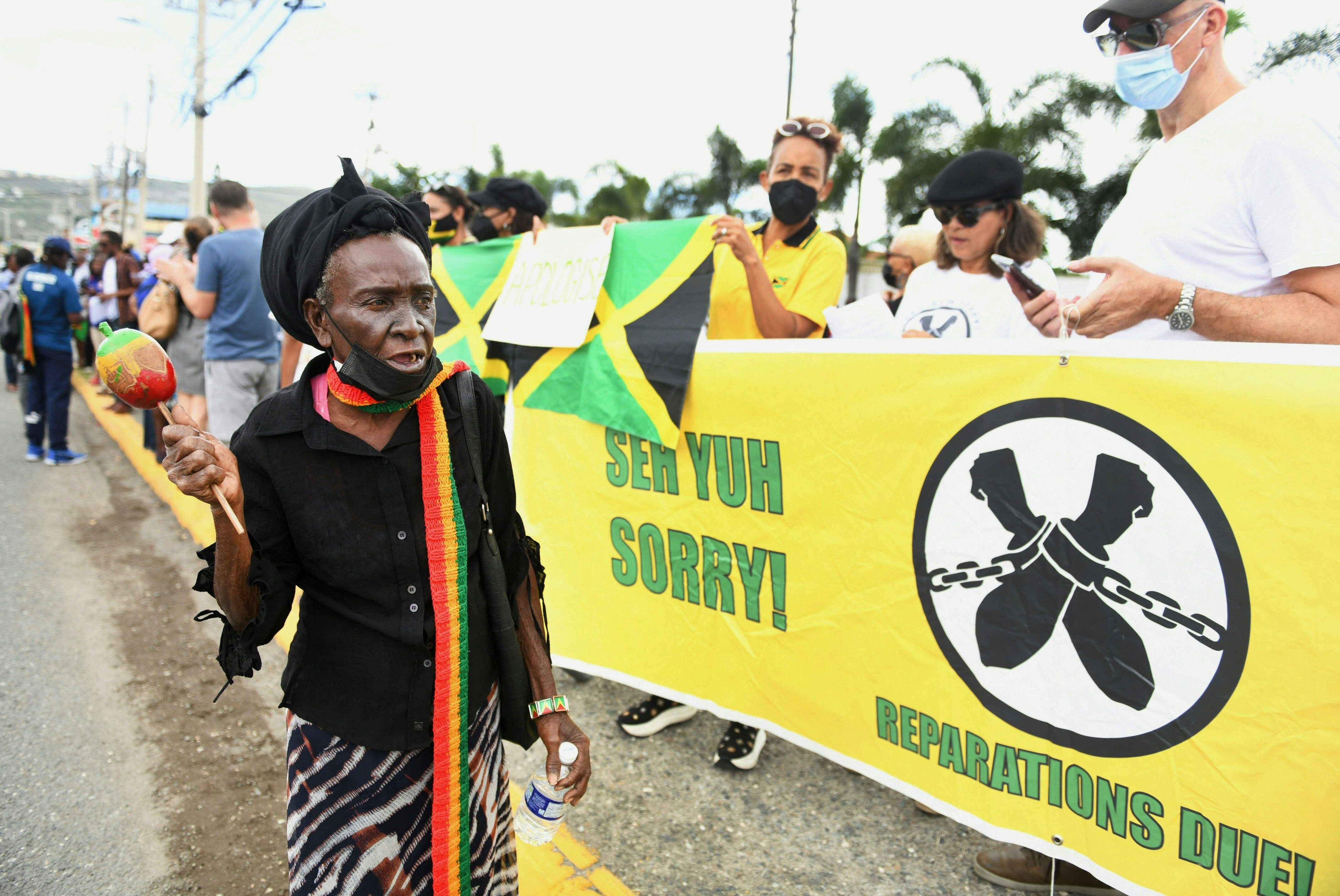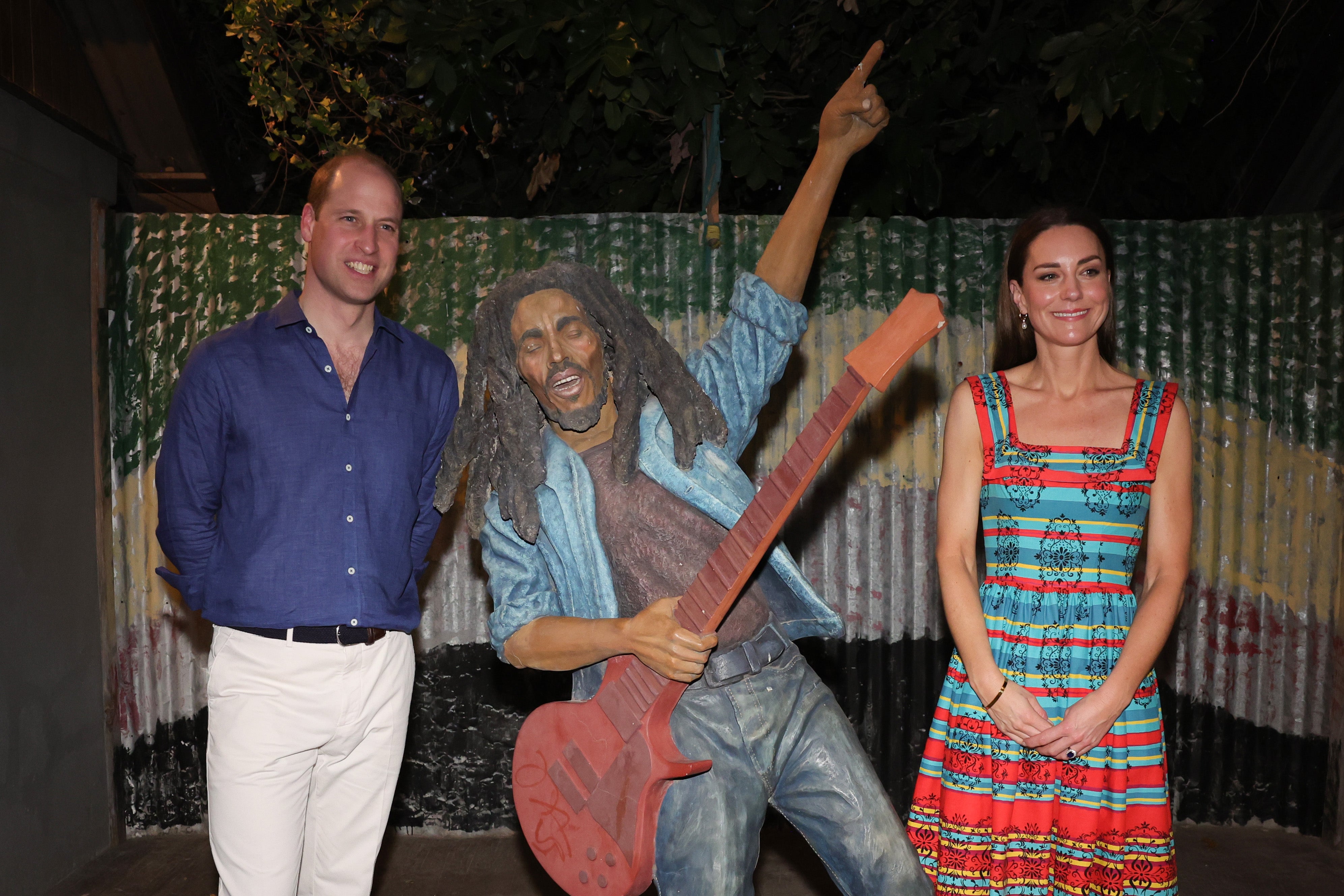Prince William to ‘acknowledge slavery’ during Jamaica visit following protests
Duke and Duchess of Cambridge met by protests in Kingston during Caribbean tour

Your support helps us to tell the story
From reproductive rights to climate change to Big Tech, The Independent is on the ground when the story is developing. Whether it's investigating the financials of Elon Musk's pro-Trump PAC or producing our latest documentary, 'The A Word', which shines a light on the American women fighting for reproductive rights, we know how important it is to parse out the facts from the messaging.
At such a critical moment in US history, we need reporters on the ground. Your donation allows us to keep sending journalists to speak to both sides of the story.
The Independent is trusted by Americans across the entire political spectrum. And unlike many other quality news outlets, we choose not to lock Americans out of our reporting and analysis with paywalls. We believe quality journalism should be available to everyone, paid for by those who can afford it.
Your support makes all the difference.Prince William is expected to acknowledge the issue of slavery during his visit to Jamaica as hundreds of protesters demanded reparations from the royal family.
The Duke of Cambridge was aware of the unrest ahead of the demonstration taking place outside the British High Commission in Kingston and will raise the issue in a speech on Wednesday night during a dinner hosted by the Governor General of Jamaica, a royal source said.
William and his wife, the Duchess of Cambridge arrived in Jamaica on Tuesday as part of a week-long Caribbean tour.
The Duke and Duchess of Cambridge arrived in Belize on Saturday to start the tour that coincides with Queen Elizabeth’s 70th year on the throne, and will conclude it over the weekend with a visit to The Bahamas.
As the royals arrived in Jamaica, at least 350 protesters took to the street a few miles away outside of the British High Commission denouncing the visit, insisting upon a formal acknowledgement of slavery with reparatory justice and calling for Jamaica to drop the Queen as head of state.
Among attendees were Billboard chart-topping reggae artist Queen Ifrica and LGBT activist/poet Stacey-Ann Chin. Demonstrators held placards reading messages such as “Kings, Queens and Princesses and Princes belong in fairytales not in Jamaica!” and “apologise!”.

Opal Adisa, a Jamaican human rights advocate who helped organise the demonstration, said: “Kate and William are beneficiaries, so they are, in fact, complicit because they are positioned to benefit specifically from our ancestors, and we’re not benefitting from our ancestors.
“The luxury and the lifestyle that they have had and that they continue to have, traipsing all over the world for free with no expense, that is a result of my great, great grandmother and grandfather, their blood and tears and sweat.”

The Advocates Network, a human rights coalition who organised the protest, also wrote an open letter detailing 60 reasons why the monarchy should compensate Jamaica, to mark the country’s 60th anniversary of independence. This was handed over to the British High Commission.
The British royal family were involved in the mass trafficking and enslavement of African people for centuries with Elizabeth I becoming an involved with the lucrative dealings of John Hawkins, one of Britain’s first slave traders in the 16th century.

The connections between the royal family and slavery continued with Charles II, who encouraged the expansion of the slave trade and granted a charter to a group of men - the Royal Adventurers - who later became the Royal African Company.
The monarch and his brother, the Duke of York, invested their private funds in the venture as this system of mass enslavement, which was not abolished until the 19th century.

After the abolition of slavery in 1833, the British government took out a £20m loan to slave-owning families, for the inconvenience of not having the luxury of free labourers, bringing about a national deficit which was only repaid in 2015 with the help of taxpayers’ money.
On the other hand, to date, there has been no compensation paid to the descendants of enslaved Africans.
The Jamaican government last year announced plans to ask Britain for compensation for forcibly transporting an estimated 12,000,000 Africans to work on sugar cane and banana plantations that created fortunes for British slave holders.
Jamaica MP Mike Henry has proposed reparations package of 7.6 billion pounds ($10 billion), saying such a figure is derived from £20m post-abolition pay-out from the British government to slave-owning families.
After the Cambridges’ arrival in Jamaica, Prince William joined Manchester City’s Raheem Sterling, Aston Villa’s Leon Bailey and young footballers on the football pitch during a visit to Trenchtown, known as the birthplace of reggae music, in Kingston.
It was there that the couple also met winners of Jamaica’s famous Manning Cup and the Jamaica National bobsleigh team members.
They joined musicians in playing drums during a visit to Trench Town Culture Yard Museum where Bob Marley used to live in what has been described as a “celebration of reggae” and the music legend’s legacy.

Responding to this, Carolyn Cooper - Professor Emerita at the University of West Indies - told The Independent : “William and Kate can’t celebrate the legacy of Bob Marley and also come here to try and get us to remain as a dependant of the British monarchy.
“Bob Marley’s message was about emancipation, chanting down systems of oppression and contesting the very notions of royalty that William and Kate represent.
“So…this move means that they simply don’t understand what his legacy is and therefore that celebration is nothing but a charade.”
This comes as the royal couple are set to fly into another slavery storm as they head to The Bahamas, another former colony of Britain, on Thursday for the final leg of their tour.
In an open letter published on Tuesday, the Bahamas National Reparations Committee issued a call for an acknowledgement of slavery and reparations from the royal family and British government.
“The Duke and Duchess may not be compelled to make such a declaration during their visit to our shores. They may not be able at this time to speak on behalf of the Queen and their Government at this time,” the body, which is part of the Caribbean Community’s Reparations Commission (CRC), wrote.
“However, they can no longer ignore the devastation of their heritage. They and their family of Royals and their Government must acknowledge that their diverse economy was built on the backs of our ancestors. And then, they must pay.”
Join our commenting forum
Join thought-provoking conversations, follow other Independent readers and see their replies
Comments